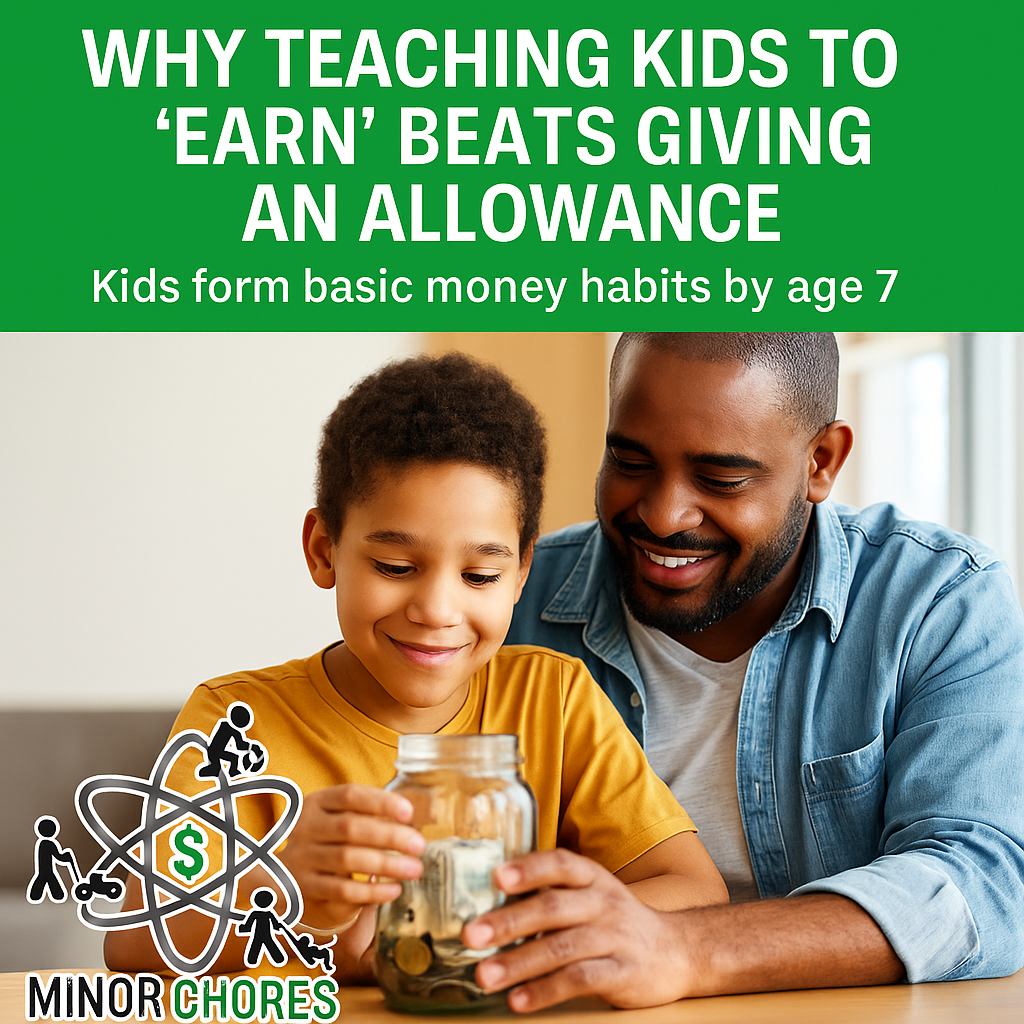Why Teaching Kids to “Earn” Beats Giving an Allowance
Kids form basic money habits by age 7
Most kids know how to spend money. Fewer know how to earn it. And when cash comes too easily, through weekly allowances with no strings attached, it can short-circuit the lessons that matter most. At Minor Chores, we believe real financial literacy starts with effort, ownership, and the satisfaction of doing the work.
💭 “Mom, can I get an allowance?”
It’s a question most parents hear sooner or later. And for decades, the answer has been a regular handout, $5 here, $10 there, just for being part of the household.
But here’s a new question:
Is giving money the same as teaching money?
When it comes to preparing kids for the real world, the difference between giving and earning might be the difference between financial dependence and financial confidence.
🧠 Passive Allowance vs. Active Earning: What’s the Difference?
There’s nothing wrong with an allowance. It can introduce basic concepts like budgeting and saving. But when money arrives without effort, like a mini “salary” with no job attached, it often teaches the wrong lessons:
Money comes automatically
Work isn’t tied to rewards
There are no consequences for missed expectations
Meanwhile, research from the University of Cambridge shows kids form basic money habits as early as age 7. That means the way we introduce money matters, early.
💡 Earning Teaches More Than Spending
When kids earn money, through real work, like chores or neighborhood jobs, they begin to understand something powerful:
💵 “Money isn’t just given. It’s created.”
This understanding forms the foundation of what experts call an earning mindset:
Effort = reward
Responsibility = freedom
Skills = value
This mindset doesn’t just help with money, it builds resilience, confidence, and self-direction.
⚖️ Chores vs. Allowance: A Quick Comparison
🛠️ How Minor Chores Makes Earning Simple (and Powerful)
Minor Chores bridges the gap between household expectations and real-world entrepreneurship. We’re not just an app that tracks chores, we’re a launchpad for kids to earn, learn, and grow.
Here’s how:
Kids select from 30+ service ideas, set pricing, and share their website
Whether it’s lawn care, dog walking, or helping neighbors with recycling, kids choose the work they enjoy, and parents can help by sharing their website with neighbors or in local social media groups. This builds a sense of independence and ownership, while allowing them to gain customers within minutes of signing up!They message customers like pros
With built-in SMS templates, reminders, and safety controls, they practice real communication skills, and learn how to follow up, clarify, and thank their clients.They track jobs, money, and progress
The app provides a visual earnings tracker, helping kids connect effort to income, and showing them how to set goals, stay motivated, and delay gratification.They learn from feedback and real results
With each job, kids get direct customer feedback and coaching from parents. If they miss a job? They feel the impact. If they crush it? They feel pride.
📈 The Results: What Parents (and Kids) Say
“My daughter stopped asking for an allowance after she started using Minor Chores. Now she sets goals and hits them. She even made a savings plan for a new bike, all on her own.”
— Parent of a 10-year-old Chore-preneur
“At first I just wanted to buy video games. Now I’m saving for my own puppy!”
— Minor Chores user, age 11
Parents are seeing their kids become:
✅ More organized
✅ More thoughtful with money
✅ More confident in their own abilities
Because when kids earn what they spend, they respect what they save, and start thinking like entrepreneurs.
💬 Final Thoughts: Don’t Just Give, Empower
Yes, allowances are easy. But earning is transformative.
It teaches kids the value of time, the importance of responsibility, and the thrill of building something of their own. Whether your child is saving for a toy, a trip, or a dream, they’ll reach it faster (and prouder) if they earn it themselves.
Turn everyday tasks into lifelong lessons in money, motivation, and mindset.
Because the best financial literacy doesn’t come from a handout-
It starts with a handshake and a job well done.


